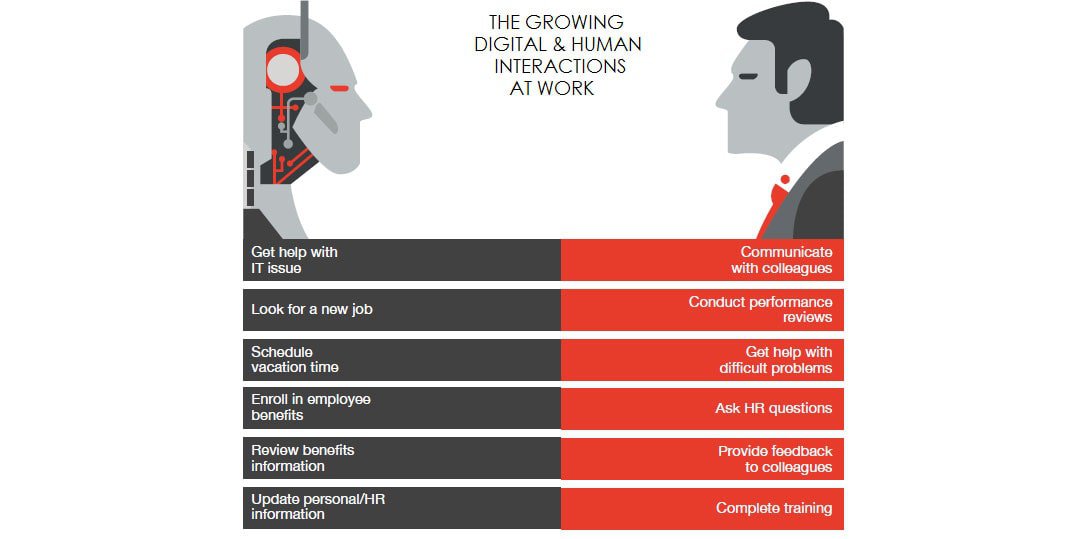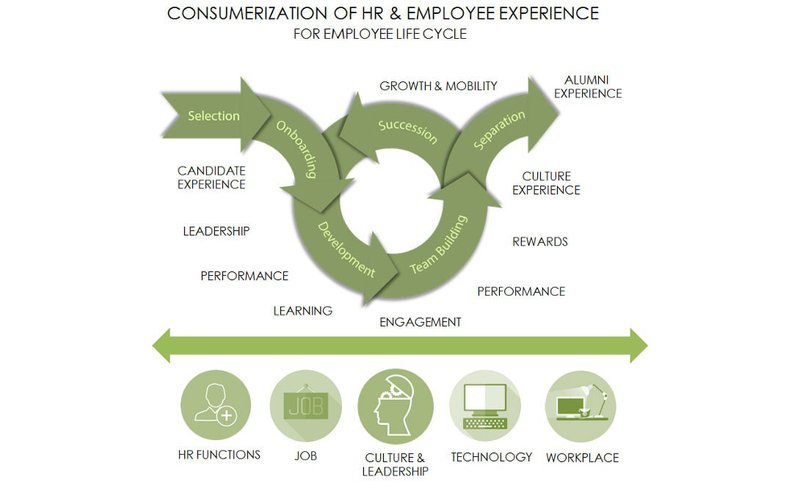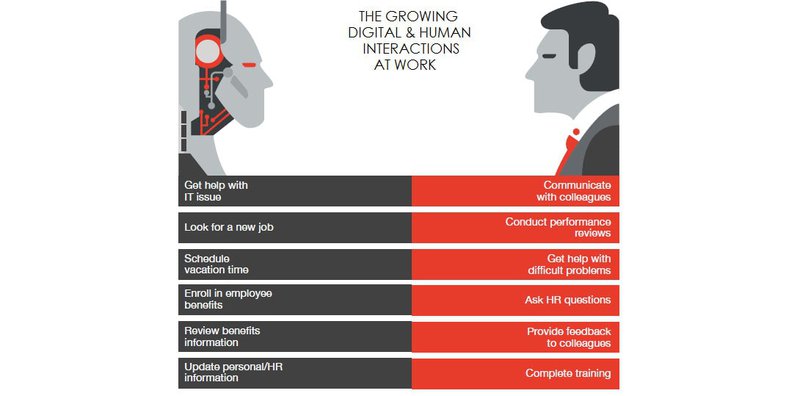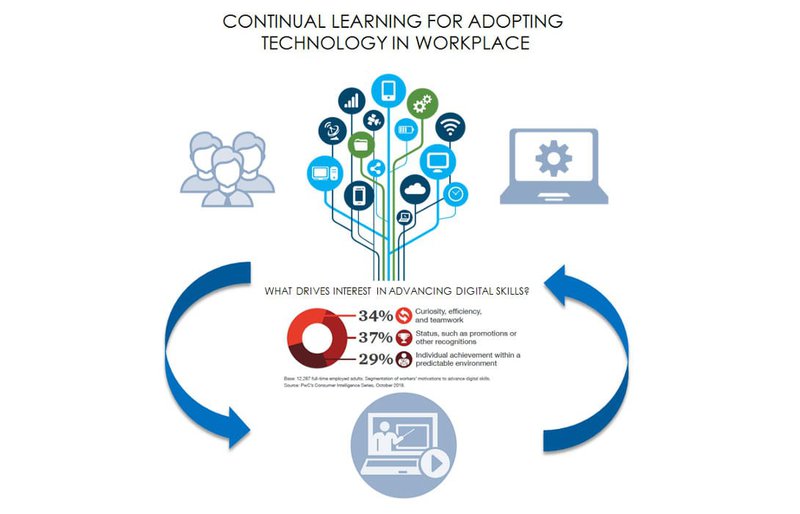Demand for both digital & human-based experience
27.06.2019 | Soumyasanto Sen

Digital technology has transformed our consumer habits. This is not only true with the customer experience journey but also with the consumerization of HR. Consumerization of HR actually refers to creating a social, mobile, and consumer-style experience for employees inside the company in their entire employee lifecycle from stages selection to the separation process.
Today organizations are aiming to provide their people with positive touch-points at all stages of the employee lifecycle. Consumerizing the employee service experience can be a win-win scenario for both workforce and companies. The experience comes from consuming HR functions, job, leadership, and culture. And the last but not the least, the technology, workplace, and the digital experience.

The workforce prefers to have an exceptional digital experience today where they can free themselves to do more important and engaging work, where they can impose value with more human skills. PwC’s latest Consumer Intelligence Report: Our status with tech at work: It’s complicated, shows how digital interactions are preferred by more workers. Almost half (43–55)% of the workers prefer digital interactions for common HR Tasks, such as:
- Getting help with IT issue
- Looking for a new job
- Update personal/ HR Information
- Enroll/ Review employee benefits
"Consumerizing the employee service experience can be a win-win scenario for both workforce and companies."
We often talk about customer experience and user experience. Both of these experiences contain essential components of the digital strategy, and at the same time, we should also realize that the transformation is directly linked to a great employee experience. Digital transformation makes sense only if the processes we optimize lead to a better experience for our customers and employees. But one thing we must make sure of is that Investing in HR Technology is Not the Same as Digital Transformation
The same PwC study shows that while 92% of C-suite execs say they’re satisfied with tech choices at work, only 68% of staff agree. Employees aren’t getting what they need and want. Fewer people feel satisfied with how technology improves the experience for HR/people management tasks.

Technology and change processes target people and their experiences. Therefore, the human experience, in general, should be the main focus of transformation.
In general, the workforce does not want interactions with machines to take place of the valuable human connections needed to feel a sense of belonging at work and provide customers with a human touch.
Many of us may feel technology is taking the workforce away from human interactions, which is not false. In the Our status with tech at work: It’s complicated report, PwC found that 35–45% of employees prefer human interactions over digital.
Here are the top areas where employees prefer HR-related tasks with more human interaction:
- Conduct performance reviews
- Communication with colleagues
- Ask HR questions
- Get help with difficult problems
- Complete Training
"PwC found that 35–45% of employees prefer human interactions over digital."
56% say they feel technology is taking them away from human interaction at work. Finding the balance between technology and humans means business leaders have to ask important questions about technology choices. Technology will maximize its impact in the workplace only when integrated with human skills.
Today, most companies are investing in minimal technology to support key HR processes, efficiency and decision making. Digital solutions to enhance the employee experience and engagement come in addition in most cases. A right digital solution can make a huge difference in change agility, having a captivating Employee Value Proposition (EVP) and see HR as an advisor on human capital risks. All these can only be achieved with human interactions on the other hand.
The workforce wants new ways of working and an employee experience that offers digital access, personalization and effectiveness. They also want digital solutions that will help them do their jobs better, faster and smarter. Employee experience interventions must be designed holistically and breakthrough functional barriers to addressing how work gets done. That helps:
- Individuals to do purposeful work for meaningful rewards and recognition encouarged by managers who provide regular feedback.
- Teams to make decisions, operate with trust and working with great user experiences.
- Company to provide a positive work environment and culture.
Shaping employee’s experience at work can have a positive impact on employee engagement — the extent to which employees are motivated to contribute and also attract new talent.

According to PwC’s latest Consumer Intelligence Series Report, today’s workforce is curious about technology and ready to invest time in learning. Employees report that they’re willing to spend up to two days per month on training to upgrade their digital skills if offered by their employer — a median response of 15 hours each month.
PwC found that most workers are motivated by two distinct incentives: improved efficiency and rewards that improve their status, which further affirms that people’s attitudes and behaviors can shape people’s willingness to adopt new technologies. The divide between incentives holds true for all levels of the workforce, including across functions, teams, and generations.
"A digital culture is needed where people are comfortable with transparency, curious about new things and aching to have the latest technology, which is critical to success"
A digital culture is needed where people are comfortable with transparency, curious about new things and aching to have the latest technology, which is critical to success. Many early adopting organizations assess how HR teams can best gather, analyze, visualize and share the data they need to execute against business objectives. For better decision making and to generate better employee experiences.
Today one can’t separate technology from your employee experience. Technology is now a backbone of the overall work experience that one can’t separate it from the people agenda. Today’s workforce is overwhelmingly positive about the potential for technology to improve their lives, but they also have concerns about how it can be used.
AI augmentation and automation are definitely shaping the future of work, but only people can unlock the value of technology investments. Without a bold culture of innovation and lifelong learning, organizations will fall behind.

Technology imprints itself on the user, creating a unique relationship. Because of this, leaders must use caution when adopting new technology in the workplace by including employees early in the process and helping them understand how the tech will be integrated to improve efficiency.
Informal leaders may also serve as a bridge between leaders and those at lower levels of the Organization. These unofficial leaders can be a powerful force in accelerating the culture and behavior changes that are essential to any successful tech-led transformation.
Adopting a continual learning mindset is what we need. Upskilling isn’t just about completing courses or adding new tools; it’s also about giving people opportunities to explore new mindsets, behaviors, relationships, and ways of working. The more organizations support their workforce in becoming digitally savvy, the greater the likelihood that decision-makers will stop thinking about how specific technologies will be transformative and instead focus on changing the ways people work.
So we can see that there is a clear demand in both digital and human-based experiences, actually, we can’t separate them and it’s complicated indeed.
"There is a clear demand in both digital and human-based experiences, actually, we can´t separate them and it´s complicated indeed."
See also medium.com.


